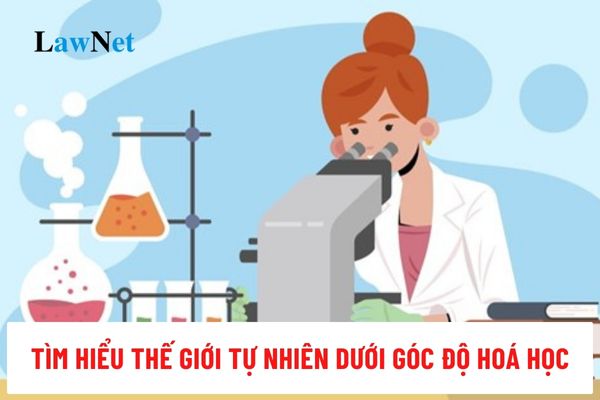What are regulations on capabilities to explore the natural world from a chemical perspective under the new program in Vietnam?
What is the type of capabilities to explore the natural world from a chemical perspective under the new program in Vietnam?
Based on Section 4 of the General Education Program in Chemistry issued with Circular 32/2018/TT-BGDDT, the subject of Chemistry develops in students chemical competence—a distinctive expression of natural science competence consisting of the following components: chemical cognition, exploration of the natural world from a chemical perspective, application of acquired knowledge and skills.
Exploring the natural world from a chemical perspective is a distinctive competence of students.

What are regulations on capabilities to explore the natural world from a chemical perspective under the new program in Vietnam? (Image from the Internet)
What are regulations on capabilities to explore the natural world from a chemical perspective under the new program in Vietnam?
The competence to explore the natural world from a chemical perspective in the new curriculum is detailed in Subsection 2, Section 4 of the General Education Program in Chemistry issued with Circular 32/2018/TT-BGDDT as follows:
Observe, collect information; analyze and process data; explain; predict the results of research on certain objects and phenomena in nature and everyday life. The specific manifestations include:
- Proposing problems: identifying and posing questions related to the issue; analyzing the context to propose the problem; articulating the problem clearly.
- Making predictions and formulating hypotheses: analyzing the problem to give predictions; developing and stating the research hypothesis.
- Planning for implementation: creating a logical framework for exploration; selecting appropriate methods (observation, experimentation, investigation, interviews, etc.); drafting an implementation plan for exploration.
- Implementing the plan: collecting events and evidence (observing, recording, gathering data, experimenting); analyzing data to prove or disprove the hypothesis; drawing conclusions and adjusting the conclusions as necessary.
- Writing, presenting reports, and discussing: using language, drawings, diagrams, and tables to express the exploration process and results; writing a report after the exploration process; cooperating with partners with an attitude of active listening and respecting viewpoints and assessments given by others to actively absorb and justify, argue, and defend the exploration results convincingly.
What are general directions for the education methods for Chemistry according to the 2018 curriculum in Vietnam?
Based on Subsection 1, Section 6 of the General Education Program in Chemistry issued with Circular 32/2018/TT-BGDDT, the general directions for the education methods for Chemistry according to the 2018 curriculum are as follows:
(1) Promote the positivity, proactiveness, creativity of students; avoid unilateral imposition and mechanical memorization; focus on fostering self-reliance and self-learning abilities so that students can continue to explore and expand their knowledge, and continue to develop qualities and competencies after graduation from high school.
(2) Train the skills to apply chemical knowledge to identify and solve practical problems; encourage and create conditions for students to experience and create based on organizing student participation in learning activities, exploration, and application.
(3) Apply educational methods in a flexible, creative manner suitable to the educational objectives, curriculum content, student subjects, and specific conditions.
Depending on the required outcomes, teachers can use a combination of many teaching methods in one topic.
Traditional teaching methods (lectures, dialogues, etc.) are used in ways that promote the positivity and proactiveness of students.
Enhance the use of teaching methods that emphasize the role of the student's learning subject (practical learning, problem-solving-based learning, project-based learning, experiential learning, exploration-based learning, differentiated learning, etc., using appropriate teaching techniques).
(4) Implement diverse and flexible forms of organizing teaching; combine individual learning, group learning, classroom learning, project-based learning, self-learning, etc.
Promote the application of information and communication technology in chemistry teaching.
Value external resources beyond the textbook and the system of teaching equipment provided; fully exploit the advantages of information and communication technology in multimedia knowledge repositories, and increase the use of electronic resources (such as experimental films, virtual labs, simulated experiments, etc.).

